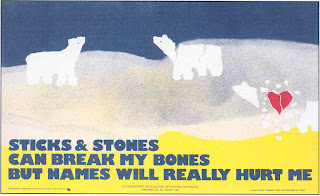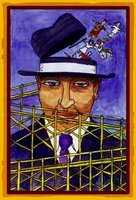We all do it

We all do it. We don’t mean to, but we do.
The audience and judges sneered when contestant Susan Boyle walked on stage on Britain's Got Talent. When she started to sing, the sneering quickly turned to awe. In the days that followed, discussions took place about how superficial we all were to laugh at her, since it turned out she possessed exceptional talent. The consensus seemed to be that, as Ms. Boyle was an extraordinary singer, it was wrong to snicker at her perceived lack of social graces and unglamorous appearance.
Hmmm…so, it’s OK to laugh at someone who looks different and who doesn’t possess exceptional talent?
A mother with a happy, smiling baby with Down Syndrome overhears other mothers talking in the park, “There but for the grace of God go I.”
A family with a child with Down Syndrome is less graced by God? Really?
On The Tonight Show, President Obama discussed his bowling score of 129 with some self-deprecating humor, "It was like Special Olympics or something."
I wonder….would this thoughtful leader have put himself down in jest by saying "Man, I bowl like a girl!" I doubt it; he knows in his heart one doesn’t put down another or even oneself, by calling someone “a girl.” And, if he slipped, Americans across the country would let him know that girls are not inferior beings.
An article in the May 2009 Diabetes Forecast focuses on the discrimination in employment against people with diabetes. It is an informative discussion about the necessity of the Americans with Disabilities Act Amendment Act and its protection of workers’ rights However, the author, almost in hushed tones, seems to need to make the point that people with diabetes aren’t really disabled. They just need the law to have a fair workplace.
What’s so terrible about having a disability, about being in that group? What’s so terrible about needing an accommodation to level the playing field, to do the essential functions of one’s job? The unemployment rate among people who are blind is 70%. Provide accommodation for insulin, snacks, and low blood sugar, but not provide text-to-read programs or Braille accommodations?
Why do we not want to be seen to be like others who are different? Can we not look a little harder to see that we share a common humanity?
Violence against children and adults with noticeable differences is much higher than against those without noticeable differences; it is prevalent in our neighborhoods, our schools, our homes. One Texas institution even ran a coordinated “fight club,” treating their clients like dog-fighting entertainment.
We, of course, don’t condone this violence, we may not even see its enormity. But we need to be aware of it. When people are beaten because of race, religion, or sexual orientation, it’s classified as a hate crime. Can we not demand that beating of people with disabilities be treated similarly?
Legislative opportunities to support our citizens with disabilities abound. The Community Choice Act would allow people the option to receive support services in the home. The United Nations Convention on the Rights of Persons with Disabilities recognizes the essential human rights of all people. The convention has been open for signatures for more than two years, and 139 countries have signed, but not the United States.
Where are our priorities?
On this Blogging Against Disablism Day, I ask myself – where is my ableism? How do I reflect the deeply ingrained prejudices of my culture? Where am I an ableist in my individual actions? In my community actions?
I give you the same challenge. Ask the tough questions.
This post is part of a worldwide blogging phenomenon, Blogging Against Disablism Day. Be sure to head over to Diary of a Goldfish to read more perspectives on ableism/disablism. Thanks, Goldfish for your extraordinary efforts again this year.
Links: my BADD 2007 post and BADD 2008 post













